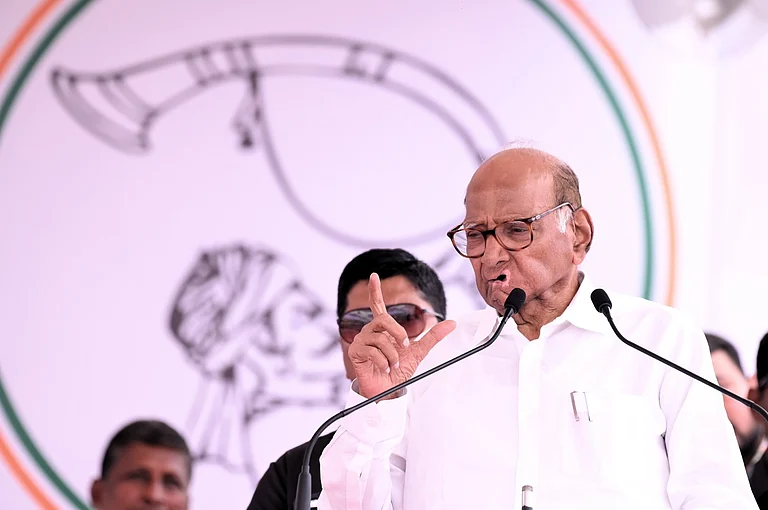IN a man's world, Sudaka is a man's village. Women in this dusty hamlet in Haryana's Nuh tehsil are born to live out male prejudices. Those who dare transgress are punished brutally. Or made to suffer tormenting rejection. This is indeed a painful story. Rife with victim women. One languishing with festering wounds in a Nari Niketan, another abandoned with a suckling infant and many others junked by their husbands in their maternal homes. All severely penalised because a woman in the village dared defy.
This terrible tale of torture and tears traces its beginnings in 19-year-old Maimun's love for Idris. Eleven years older than her and a father of two, the child woman was not considered a suitable match for Idris by the Sudaka elders. Not because he was already married. Most men in the village after all, they reasoned, have more than one wife. Maimun was ineligible because she belonged to a lower butcher Kureshi caste while Idris was a higher land-tiller Meo.
Braving the wrath of elders, however, Maimun convinced Idris into elopement and wedding in Gurgaon on June 8. Once married, the couple went to Idris' cousin's house to sort out their intimidating future. But discovery happened dangerously sooner than they anticipated. In less than two days, four Sudaka men broke into their cousin's home and their lives.
"Idris ran to save himself," moans a frail Maimun now wasting away in Karnal's Nari Niketan. Her scars unable to take away from her sharp features and clear complexion, gaunt Maimun weakly mouths her misfortunes: "I was dragged into a jeep. Beaten and raped. And raped yet again. Men changed. They were about twelve. All from my village. I fainted...to wake up and find yet another body on mine." Too weak to let out a full-throated sob, she heaves out her sorrow in incoherent whimpers. She recalls the punitive violence as if reliving it.
"They beat me and told me it was what I deserved for marrying above my caste. One night my cousin Jalaluddin took me into an alley and stabbed me." Then, as if by force of habit, she lifts her kurta to show the blood-curdlingly long knife wound that divides her stomach into two. Going on to point out the many other scars that speak of a vengeful knife being jabbed hard into a defenceless body. A long slit on the neck much like a butcher's handiwork on a fowl. A cut on the nerve in the nape to make an eye smaller than the other. Finally, a plunge of a wound in the palm—a reminder of the knife that must have ripped through.
Strangers discovered her and took her to a hospital. Idris found her yet again. And this time they approached the National Commission for Women (NCW) for help.
Only to have the furious Sudaka villagers up in arms when NCW chairperson Mohini Giri took the couple back into the village on August 14 to sort out matters. Slogans such as "Hum ek aur Kashmir banayenge" rent the air. Hundreds of villagers surrounded the NCW car, broke it open and dragged out Maimun. And kept her there. A shaken Giri later told the press: "They took out the girl like a piece of meat."
Back in Delhi, Giri contacted Union Home Minister Indrajit Gupta and despatched people to rescue the girl. Sudaka has taken it as an insulting interference in a personal matter. They wanted Maimun to be a lesson for other women. But the Mahila Mandali thwarted their 'noble' intentions.
The frustration prevails. The tension in the village is tangible. And hostility palpable. SHO at the Nuh thana, Ram Bhagat, warns visitors of the perils of a confrontation. "They are very angry after the Mahila Mandali's visit. They will harm first and think later. They are fuming at the fact that Maimun has been taken away and kept in some women's shelter. Their revenge is not complete. Best to avoid," the cop pleads. Unable to convince, he grumblingly lends an escort. But not without giving directions: "Wear your uniform and carry your gun..."
A gathering of elders is venting frustrated anger in a huddled corner. The sight of visitors only makes matters worse. "More of the Mahila Mandali, are you? Where is our daughter? Bring her back," they shout menacingly. Young Qazi Akhtar Hussain's voice rises to a fanatic pitch as he declares Sudaka strong enough to take on a world that interferes in its personal matters. Octogenarian Haji Shabbir Ahmed waves his arms in the air melodramatically and curses himself for choosing India over Pakistan. "In this non-Muslim country we'll now have women deciding to marry above their caste and city women telling us that all this is normal! All you city types just get lost and return Maimun to us."
Using urban grammar to make the same point, Maimun's father Shakkur insists he has certificates to prove the girl is only 16 years old and a minor. He accuses Idris of abducting his daughter. Bored with such reasonable objections, some younger men start hollering their abusive objections to having outsiders in the village.
The frenzy over, the elders in the crowd shout above each other to hammer in their world view. "The only way out now is to get the girl back and get her married off to someone in her own caste," pronounces old Samsher. "Otherwise Nuh's daughters will continue to be thrown out from their husbands' homes. After all, we can't blame people for discarding daughters-in-law who hail from a village that breeds characterless girls like Maimun."
Suddenly, the story begs sympathy for the next lot of victims. Hit hard by yet another set of male prejudices: daughters from Maimun's village certainly can't be worthy daughters-in-laws, so dump them back in infamous Nuh. Khatoon sent back by her in-laws from her Utavad home in Faridabad, Jaffran exiled from her Tikri Rajpura abode, Praveen dumped back in Sudaka by her husband in Sakars. Their scars are not visible. They say nothing, their eyes begging for Maimun. For only her imprisonment in Nuh can deliver them their liberation.
Few hundred yards away, yet another woman's life is distorted by the twists in the tale. Locked up by her mother-in-law in a windowless room, Idris' first wife Sub-hani Begum clings on to her four-year-old son and five-month-old daughter. Says Pradhan Bag Singh from Vishambara in Mathura district: "I am the head of her maternal village. We heard of this unfortunate affair and brought her in here. She'd been left by Idris in Vishambara. But his parents have just locked her up since she stepped in. Tell me what is her fault in all this! She's wanted by none." And none to hear her side of the story either.
Except, ironically, for Maimun. "I'll take care of her. We'll be happy together: Subhani and me. We'll be like sisters," she strains her fading voice to find all the strength she can gather to convince. "We'll take care of Idris and the children and each other. Why don't the men let us try?" Maimun's meek question is a cry for equal opportunities. Hope the Sudaka male is unable to smother her into silence.


























